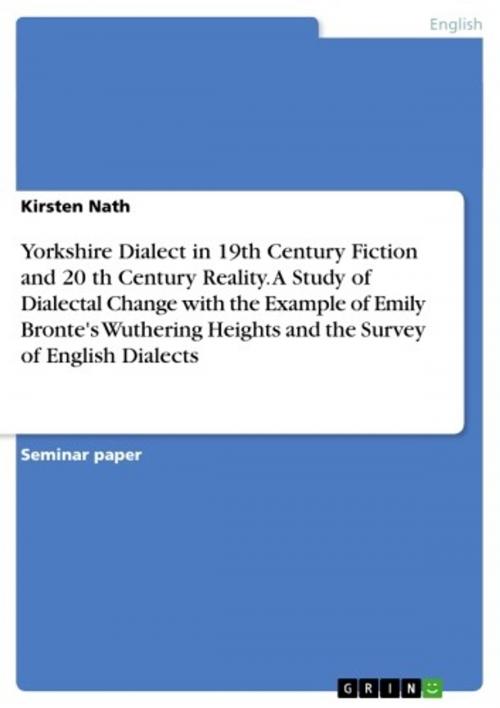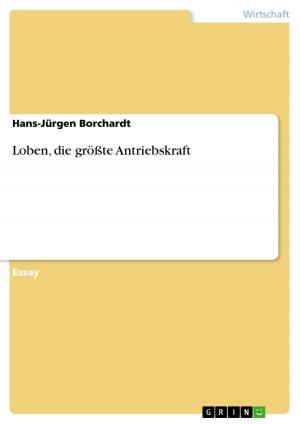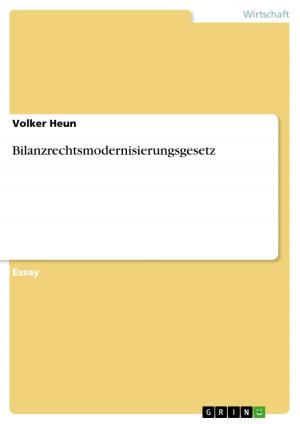Yorkshire Dialect in 19th Century Fiction and 20 th Century Reality. A Study of Dialectal Change with the Example of Emily Bronte's Wuthering Heights and the Survey of English Dialects
Nonfiction, Entertainment, Drama, Anthologies| Author: | Kirsten Nath | ISBN: | 9783638427067 |
| Publisher: | GRIN Verlag | Publication: | October 12, 2005 |
| Imprint: | GRIN Verlag | Language: | English |
| Author: | Kirsten Nath |
| ISBN: | 9783638427067 |
| Publisher: | GRIN Verlag |
| Publication: | October 12, 2005 |
| Imprint: | GRIN Verlag |
| Language: | English |
Seminar paper from the year 2005 in the subject English Language and Literature Studies - Linguistics, grade: 1-, University of Hamburg (Institut für Anglistik und Amerikanistik), course: Proseminar: English Dialects, 10 entries in the bibliography, language: English, abstract: 'Emily Brontë's only novel is considered to be one of the most powerful and enigmatic works in English literature.' (Alexander/Smith 2003: 553)Wuthering Heights(first published in 1847) is indeed a very powerful novel which is to its greatest part achieved by its setting in the Yorkshire moors and the realistic representation of the local transactions. Emily Jane Brontë was born in 1818; at the age of two she moved with her family to Ha-worth, West Riding of Yorkshire. Except for a few short journeys, Emily Brontë stayed in Yorkshire all her life and could thus vividly describe her Yorkshire surroundings as the setting of her novel. Furthermore, the Yorkshire dialect (based on Haworth dialect) in the speech of some of her characters adds to the completeness of the novel's setting (Waddin gton-Feather 2004: 1). Most characters in the novel use a dialect word or phrase every now and then; Joseph, however, speaks Yorkshire dialect almost exclusively. Joseph is the old servant at Wuthering Heights (which is both, the name of the novel and that of the house). Joseph is very religious and loyal to whoever is his master at the time. Ac-cording to Ellen Dean, the housekeeper at Wuthering Heig hts, he is 'the wearisomest, selfrighteous Pharisee that ever ransacked a Bible to rake the promises to himself and fling the curses on his neighbours.' (Brontë 1994: 48-49) Hence, Joseph is an ambiguous character in the mind of the reader: on the one hand, he is always grumpy, quite harsh and even mean at times; on the other hand, he is an old man who is always truthful and loyal ; it seems he is always as good a person as his respective master is. Joseph's use of dia lect reflects the roughness of Wuthering Heights and its surroundings. The old man speaks an old dialect and lives in the old farmhouse. The house is habitable but not comfortable and it is always exposed to stormy weather. The same holds true for Joseph's dialect: it is intelligible but not easy to understand and it is constantly looked down upon by the higher classes. Joseph's dialect sounds quite rough although there is a certain beauty in it, just like the Yorkshire moors are said to be rough but beautiful. Finally, it suggests a lack of education if a speaker uses dialect solely, as Joseph does. Nonetheless, Joseph and his dialect resist all the storms which approach throughout the novel.
Seminar paper from the year 2005 in the subject English Language and Literature Studies - Linguistics, grade: 1-, University of Hamburg (Institut für Anglistik und Amerikanistik), course: Proseminar: English Dialects, 10 entries in the bibliography, language: English, abstract: 'Emily Brontë's only novel is considered to be one of the most powerful and enigmatic works in English literature.' (Alexander/Smith 2003: 553)Wuthering Heights(first published in 1847) is indeed a very powerful novel which is to its greatest part achieved by its setting in the Yorkshire moors and the realistic representation of the local transactions. Emily Jane Brontë was born in 1818; at the age of two she moved with her family to Ha-worth, West Riding of Yorkshire. Except for a few short journeys, Emily Brontë stayed in Yorkshire all her life and could thus vividly describe her Yorkshire surroundings as the setting of her novel. Furthermore, the Yorkshire dialect (based on Haworth dialect) in the speech of some of her characters adds to the completeness of the novel's setting (Waddin gton-Feather 2004: 1). Most characters in the novel use a dialect word or phrase every now and then; Joseph, however, speaks Yorkshire dialect almost exclusively. Joseph is the old servant at Wuthering Heights (which is both, the name of the novel and that of the house). Joseph is very religious and loyal to whoever is his master at the time. Ac-cording to Ellen Dean, the housekeeper at Wuthering Heig hts, he is 'the wearisomest, selfrighteous Pharisee that ever ransacked a Bible to rake the promises to himself and fling the curses on his neighbours.' (Brontë 1994: 48-49) Hence, Joseph is an ambiguous character in the mind of the reader: on the one hand, he is always grumpy, quite harsh and even mean at times; on the other hand, he is an old man who is always truthful and loyal ; it seems he is always as good a person as his respective master is. Joseph's use of dia lect reflects the roughness of Wuthering Heights and its surroundings. The old man speaks an old dialect and lives in the old farmhouse. The house is habitable but not comfortable and it is always exposed to stormy weather. The same holds true for Joseph's dialect: it is intelligible but not easy to understand and it is constantly looked down upon by the higher classes. Joseph's dialect sounds quite rough although there is a certain beauty in it, just like the Yorkshire moors are said to be rough but beautiful. Finally, it suggests a lack of education if a speaker uses dialect solely, as Joseph does. Nonetheless, Joseph and his dialect resist all the storms which approach throughout the novel.















